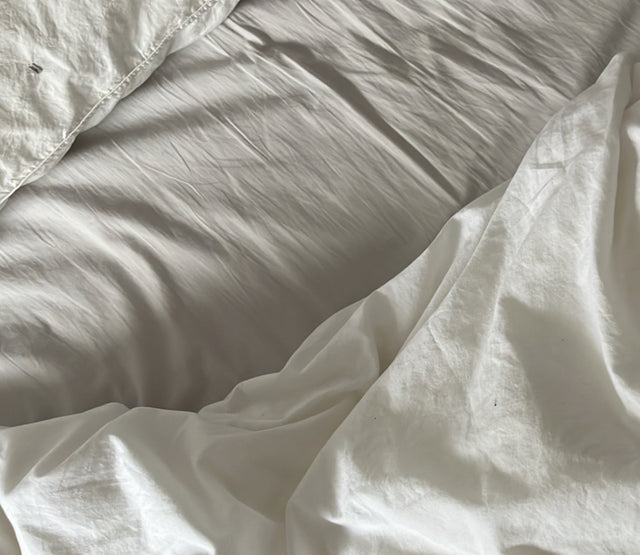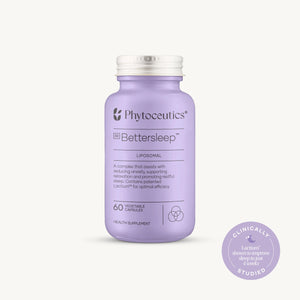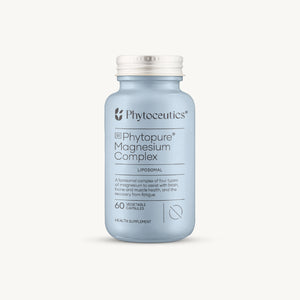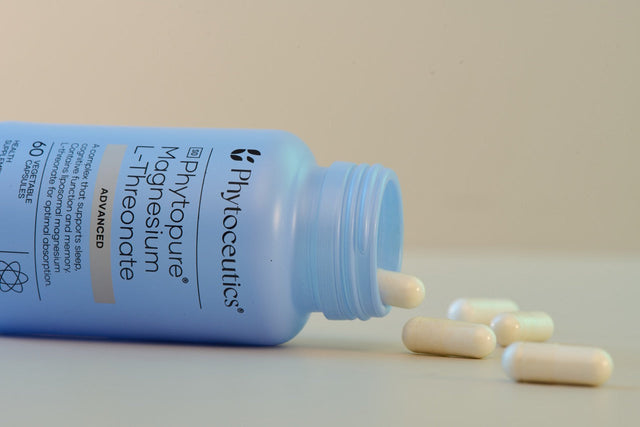While you rest, your body and brain are hard at work- restoring, balancing, and preparing you for the day ahead. Good sleep is essential for maintaining energy and focus, supporting cognitive abilities, regulating hormones, managing mood and mental health, and controlling inflammation. Without it, many aspects of your health can unravel, sometimes in ways you might not immediately recognise.
Sleep plays a vital role in helping the body recover, repair, and operate at its peak. Gaining a better understanding of how sleep cycles work can support healthier sleep habits and help you wake up feeling truly rested.
What are the Different Types of Sleep?
Scientists categorise sleep into two main types: REM (rapid eye movement) sleep, also known as dreaming sleep, and non-REM (non-rapid eye movement) sleep, often referred to as quiet or restorative sleep. Interestingly, REM and non-REM sleep are extremely different – not only from each other but also from the waking state. Both play essential roles in maintaining physical and mental energy [16].
The Role of Non-REM and Deep Sleep
Non-REM sleep includes three stages, beginning with light sleep and progressing through deeper stages. The final stage – deep sleep, also called slow-wave sleep – is believed to be the most restorative. This is when your body does the bulk of its physical repair and renewal work. It’s during deep sleep that the body ramps up the production of ATP (adenosine triphosphate), which fuels every cell in your body and is crucial for energy [6].
During this stage, blood flow shifts away from the brain, allowing it to cool slightly. At the same time, the pituitary gland releases a surge of growth hormone, which triggers tissue repair and muscle rebuilding. Researchers have also observed a rise in immune-activating substances during deep sleep, suggesting it may help prime the body to fight off illness and infection [11,6].
People who don’t get enough deep sleep often wake up feeling unrefreshed, even if they’ve technically spent enough hours in bed. In fact, when someone who is sleep-deprived finally gets some rest, their body tends to bypass the lighter stages of sleep and drop straight into deep sleep, spending more time there. This suggests that deep sleep serves a critical function in overall health and recovery [6].
The Power of REM Sleep for the Brain
While deep sleep helps heal the body, REM sleep appears to be especially important for the brain. This stage may help the brain process and organise information, as well as clear out unneeded details. In one study, students who viewed a complex visual puzzle and then got a full night’s sleep performed significantly better at solving it later, compared to students asked to solve it right away. The findings suggest that the brain continues working behind the scenes as you sleep [12,6].
The Importance of Sleep for Energy and Cognitive Function
When you get a full night’s rest, your body undergoes important processes that restore your energy reserves. Sleep replenishes glycogen stores and prepares your brain for optimal focus and attention [7]. Without sufficient rest, it becomes significantly harder to concentrate, complete tasks efficiently, and retain information.
Sleep plays a major role in memory consolidation, problem-solving, and decision-making. Research has shown that sleep deprivation impairs cognitive performance [6] similarly to alcohol intoxication and can also contribute to a negative mood state [5]. For instance, a study involving professional truck drivers revealed that after 28 hours without sleep, their performance accuracy and reaction times were as impaired as they would be with a blood alcohol concentration of 0.1% [13]. Lack of sleep slows down thinking, reduces attention span, and increases the likelihood of making mistakes. Over time, poor sleep is also associated with an increased risk of cognitive decline and neurodegenerative diseases [14,5].
How Does Sleep Impact Your Hormones?
Sleep is tightly connected to hormone balance, influencing everything from metabolism to reproductive health. During deep sleep, the body regulates key hormones such as cortisol (the stress hormone), insulin (which manages blood sugar), and ghrelin and leptin (which control hunger and fullness). Studies have shown that inadequate sleep disrupts these processes, leading to a higher risk of weight gain, insulin resistance, and hormonal imbalances [2,3].
Your hormones don’t operate in isolation – they are deeply influenced by your sleep and circadian rhythm – a natural rhythm that runs on a roughly 24-hour schedule, guiding physical, mental, and behavioural shifts in living organisms. In fact, almost every hormone in your body relies on your sleep-wake cycle to function properly [2,3].
Cortisol: The Stress Hormone
Cortisol spikes within 30 – 45 minutes of waking to set the tone for the day. Chronic poor sleep leads to elevated cortisol, which disrupts other hormones, leaving you feeling sluggish and out of balance. A review of 12 studies that tracked cortisol levels over at least 24 hours under different sleep conditions found that reducing sleep to 5.5 hours or less per night often led to higher cortisol levels in the afternoon or evening.
In contrast, studies that allowed 6 hours of sleep or measured cortisol less frequently generally did not observe this rise. These findings suggest that a significant amount of sleep restriction is needed to trigger an increase in evening cortisol, supporting earlier research showing that both partial and total sleep deprivation can elevate cortisol the following night [8].
Hunger Hormones & Metabolism
Lack of sleep disrupts key appetite-regulating hormones like leptin, ghrelin, and insulin, triggering cravings, increased hunger, and poor blood sugar control. Leptin is secreted by fat cells and plays a crucial role in suppressing appetite and regulating energy balance. Under normal conditions, high leptin levels signal the brain that the body has sufficient energy stores, reducing the urge to eat.
Studies show that restricted sleep (e.g. 4–5 hours per night) causes significantly reduced leptin levels which falsely signal the brain that the body is in an energy-deficient state that causes an increase in appetite and food-seeking behaviour [3]. Ghrelin is produced mainly in the stomach, and it’s the only known circulating hormone that stimulates appetite. Its levels typically rise before meals and fall after eating.
Effects of sleep deprivation cause increased ghrelin levels that promote hunger, especially for high-carb, high-fat foods. The simultaneous increase in ghrelin and decrease in leptin creates a hormonal profile strongly favouring overeating. This dysregulation mimics a state of energy deprivation, even when energy stores are sufficient [3]. Insulin is a hormone that allows cells to absorb glucose from the bloodstream for energy. Insulin sensitivity is a measure of how effectively cells respond to insulin.
One study found that just a single week of sleeping 5 hours per night led to a significant reduction in insulin sensitivity in healthy individuals. Insulin resistance means cells do not respond well to insulin, so glucose remains in the bloodstream – leading to higher blood sugar levels. This condition increases the risk for type 2 diabetes and metabolic syndrome [2][9].
Growth Hormone & Repair
Growth hormone (GH) helps your body build muscle, burn fat, repair tissues, and support healthy metabolism. Most of your GH is released during deep sleep, especially in the first few hours of the night. Under normal conditions, GH is secreted in pulses throughout the day, with the most substantial pulse occurring during early sleep. Sleep deprivation not only reduces the amplitude of these pulses but also disrupts their regularity, leading to a more unpredictable secretion pattern.
Low GH due to poor sleep can lead to slower muscle recovery, increased body fat, poor blood sugar control, brain fog or memory issues. Even exercise-induced GH release is reduced if you are sleep deprived. Getting enough quality sleep is one of the most natural and powerful ways to support your body’s recovery, metabolism, and performance by keeping growth hormone levels healthy [2][9][10].
Why Is Good Quality Sleep So Difficult?
Despite knowing how important sleep is, many of us struggle to achieve it consistently. Several modern-day habits and stressors interfere with the body’s natural sleep-wake cycle (circadian rhythm).
- Poor Sleep Hygiene: Sleep hygiene refers to healthy sleep habits that promote good quality rest. Poor habits– such as irregular sleep schedules, late-night eating, or doing stimulating activities before bed – can make it difficult for your brain to recognise when it’s time to wind down.
- Stress: Chronic stress keeps your body in a state of high alert, releasing adrenaline and cortisol that disrupt natural sleep patterns. Many people lie awake at night replaying stressful events or worrying about the future, making it difficult to fall asleep or stay asleep.
- Blue Light and Devices: Exposure to blue light from smartphones, tablets, and computers close to bedtime suppresses melatonin production, the hormone that signals your body it’s time to sleep. This delay in melatonin release can trick your brain into thinking it’s still daytime, delaying the natural urge to sleep.
- Caffeine and Alcohol: Caffeine, found in coffee, tea, energy drinks, and even some medications, is a stimulant that can linger in your system for several hours, making it harder to fall asleep. And, although alcohol may initially make you feel drowsy, it disrupts the later stages of sleep, leading to fragmented and poor-quality rest [15].
What Happens When You Don’t Sleep Well?
When you consistently fail to get enough quality sleep, the consequences add up quickly – and they are not limited to just feeling tired.
Fatigue and Brain Fog
Without proper rest, your body doesn’t fully recharge. You may wake up feeling groggy, sluggish, and unable to think clearly. Brain fog becomes a common issue, making even simple tasks feel overwhelming.
Hormone Imbalance
As previously discussed, sleep deprivation affects insulin sensitivity, cortisol regulation, and appetite hormones. Over time, these disruptions can lead to hormonal imbalances that contribute to conditions like metabolic syndrome, type 2 diabetes, and reproductive health issues [2,9].
Weakened Immunity
Sleep is essential for maintaining a strong immune defense. Poor sleep weakens the body's ability to fight infections and increases the risk of illness. During sleep, your immune system releases proteins called cytokines, which help fight infection and inflammation. Sleep disruptions can lower the production of these protective cytokines and impair immune function.
A 2021 study published in Communications Biology found that insufficient sleep alters immune responses and promotes inflammation throughout the body [1]. Chronic inflammation, in turn, is linked to many serious health problems, including heart disease, diabetes, and autoimmune disorders. It has also been found that there is a strong two-way relationship between sleep and mental health.
Sleep deprivation can increase irritability, anxiety, and symptoms of depression. Meanwhile, poor mental health can make it harder to fall asleep or stay asleep. Over time, this creates a vicious cycle that can significantly worsen emotional well-being [5].
Getting enough high-quality sleep is not just about feeling rested – it’s about supporting every system in your body, from your brain to your immune defense. In today’s fast-paced world, it can be challenging to prioritise sleep, but the consequences of ignoring it are too significant to overlook.
By adopting better sleep hygiene practices, managing stress, being mindful of caffeine and alcohol intake, and considering supplementation, you can set yourself up for deeper, more restorative sleep.
Disclaimer: This content is for informational purposes only and does not constitute medical advice. Always consult with your healthcare provider before starting any new supplement, especially if you are pregnant, nursing, have a medical condition, or are taking prescription or chronic medication.








